Read Time: 6 Minutes Subscribe & Share
Covid Reflections
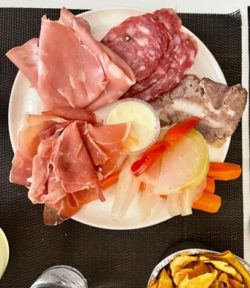 We are quarantined due to an an inconvenient case of mild breakthrough Covid in Italy – having been ground zero for Covid in the western world makes Italy a pretty good place to recover. Draghi’s government has imposed stricter rules and most people comply – and even most smokers remove their masks only while inhaling. The crazies are here, but not in alarming and vociferously vocal abundance (no horrifying videos of passengers punching flight attendants on domestic flights). The medical services are great and affordable, even if you are not an Italian citizen, and you can’t beat the carryout here. So, in addition to working on my halting Italian with Duolingo and Italiano Per La Vita, I have been reading and watching films about the different forms of alternative agriculture and how they contrast to conventional farming. The importance of consumers understanding what’s behind their food choices cannot be underestimated. The more engaged we become in supporting alternative farming (never underestimate your grocery purchasing power) the greater the force to trim Big Ag and its growing monopoly on (aka: degradation of) our food sources.
We are quarantined due to an an inconvenient case of mild breakthrough Covid in Italy – having been ground zero for Covid in the western world makes Italy a pretty good place to recover. Draghi’s government has imposed stricter rules and most people comply – and even most smokers remove their masks only while inhaling. The crazies are here, but not in alarming and vociferously vocal abundance (no horrifying videos of passengers punching flight attendants on domestic flights). The medical services are great and affordable, even if you are not an Italian citizen, and you can’t beat the carryout here. So, in addition to working on my halting Italian with Duolingo and Italiano Per La Vita, I have been reading and watching films about the different forms of alternative agriculture and how they contrast to conventional farming. The importance of consumers understanding what’s behind their food choices cannot be underestimated. The more engaged we become in supporting alternative farming (never underestimate your grocery purchasing power) the greater the force to trim Big Ag and its growing monopoly on (aka: degradation of) our food sources.
In last week’s post about Alan York and his posterchild biodynamic farm, a well funded operation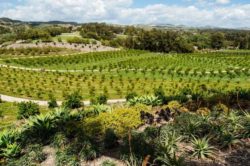 through an anonymous venture capitalist and others was based on the Chester’s commitment to biodynamic farming. As a side note, in a recent inteview with John Chester, he remarked that in the drought and wildfires prevalent in his area, Apricot Lane’s trees were less susceptible to dry tinder fire outbreaks, as the farm’s water conservation program kept them well saturated. This shows that there is more to be gained from expanded organic principles than just tasty food and soil rebirth. While biodyanamic and organic principles have been written about for well over a century, the new phrase on the block is regenerative organic.
through an anonymous venture capitalist and others was based on the Chester’s commitment to biodynamic farming. As a side note, in a recent inteview with John Chester, he remarked that in the drought and wildfires prevalent in his area, Apricot Lane’s trees were less susceptible to dry tinder fire outbreaks, as the farm’s water conservation program kept them well saturated. This shows that there is more to be gained from expanded organic principles than just tasty food and soil rebirth. While biodyanamic and organic principles have been written about for well over a century, the new phrase on the block is regenerative organic.
It’s All In The Name
Biodynamic farming requires a pretty stiff certification from Demeter. And it differs from other forms of alternative farming in its demand for an almost closed ecosystem. Since the label of “Organic” has now 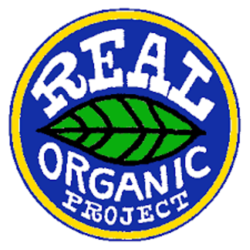 become such a profitable brand, hotly contested standards for organic certification have developed, and large food corporations have spent millions to dilute the hard fought for and original intent of USDA organic certification. Now several new organic organizations are creating certifications that are untainted by corporate greed. It’s a valiant and worthwhile struggle.
become such a profitable brand, hotly contested standards for organic certification have developed, and large food corporations have spent millions to dilute the hard fought for and original intent of USDA organic certification. Now several new organic organizations are creating certifications that are untainted by corporate greed. It’s a valiant and worthwhile struggle.
Even hydroponic food producers successfully fought to be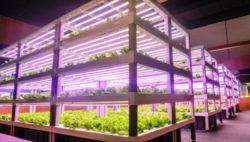 included under the USDA organic umbrella, because the organic cachet meant bigger bucks. In my opinion, hydroponic is not organic, as it is a water-based feeding system and as such, soil is a non-player. As a consumer, I have bought hydroponic produce – mostly lettuce – but it clearly lacks the flavor intensity of produce grown in soil. And with hydroponic companies “winning” the USDA Organic label, this allowed corporations to file down land mechanically, cover it in plastic, and set out plastic and metal containers and feeding systems in enclosed environments. Since when does “organic” mean “no sun or soil required”?
included under the USDA organic umbrella, because the organic cachet meant bigger bucks. In my opinion, hydroponic is not organic, as it is a water-based feeding system and as such, soil is a non-player. As a consumer, I have bought hydroponic produce – mostly lettuce – but it clearly lacks the flavor intensity of produce grown in soil. And with hydroponic companies “winning” the USDA Organic label, this allowed corporations to file down land mechanically, cover it in plastic, and set out plastic and metal containers and feeding systems in enclosed environments. Since when does “organic” mean “no sun or soil required”?
It Starts With Soil
The term regenerative agriculture or even regenerative organic agriculture has been more of a collection of ideas stemming from the founding tenets of organic and biodynamic farming, bundled together currently with sequestering more carbon in our soils as a way of easing climate change. Organic farming’s original tenets were based on the non-chemical-based maintenance of healthy soil, pasturage and lack of 20th century confinement of livestock. Biodynamics preaches the development of a balanced and biodiverse ecosytem within a farming property. Regenerative agriculture – which includes tenets from both philosophies, additionally embraces some social and consumer issues that are now painfully pressing on our radar screens. With formation of the Regenerative Organic Alliance, hopefully a new chink has developed in the armour of Big Ag.
ROA’s Big Three
Applicants for ROA certification must commit to building the organic matter in soil, using conservation-approved tillage, cover crops and rotation. No applicant can use GMO products or gene editing processes. Hydroponics is forbidden, as is any synthetic treatment. Biodiversity is promoted, as is rotational grazing for livestock.
ROA further defines membership by insisting on humane animal husbandry, which includes the Five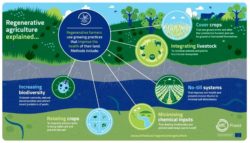 Freedoms: no discomfort, fear/distress, hunger, pain from injury or disease and most importantly the freedom to express normal behavior. This obviously includes that farm livestock be pasture-raised and grass-fed where applicable. It also encourages appropriate shelter, limited transport of livestock and forbids any form of CAFO – concentrated animal feeding operation.
Freedoms: no discomfort, fear/distress, hunger, pain from injury or disease and most importantly the freedom to express normal behavior. This obviously includes that farm livestock be pasture-raised and grass-fed where applicable. It also encourages appropriate shelter, limited transport of livestock and forbids any form of CAFO – concentrated animal feeding operation.
Where this association moves beyond older forms of sustainable agriculture is in championing social rights as related to agriculture. It promotes the development in farming communities of democratic organizations, and emphasizes that all farm members have an obligation to strengthen respective skills and resources. ROA advocates for fair payments to farmers, good working conditions and living wages for workers, and forbids forced labors. It demands a long-term commitment to the farm by the applicant and will audit members for transparency and accountability. Obviously, many corporations using the shelter of USDA organic would not make the grade.
Money Talks
In answer to the need for investment capital that has its nose sniffing in the right direction (such as the anonymous venture capitalist for Apricot Lane Farms) help is on the way. A Google search reveals a spadeful of funds that support sustainable, biodynamic, organic and regenerative organic farming and ranching ventures. One such investment group is Bio-Logical Capital . As a capital management partner in a variety of ventures, one that stood out for me was what Bio-Logical Capital is accomplishing in partnership with an ROA farm in Vermont – Philo Ridge Farm
Bio-Logical Capital was founded by a board member of The Nature Conservancy and has a small board of activist investors. While real estate development is sometimes part of their land management approach, it differs in that they want to integrate renewable energy, water stewardship, and regenerative and sustainable agriculture. There is a focus on land health and building sustainable communities around that objective. They work with farms to develop “sustainable land-based businesses.” The current owners of Philo Ridge Farm wanted to restore the 400 acres of a depleted dairy farm. Barns and the main house were restored, some lands were leased to young farmers who themselves wanted to use sustainable methods of agriculture. Philo Ridge, with oversight from Bio-Logical Capital members, now produces pork, chicken, beef, lamb. They harvest organic hay, grains, vegetable, fruits, nuts, flowers and mushrooms. They have organized a year-round store on the premises where wool blankets from their sheep are sold along with other locally made products.
around that objective. They work with farms to develop “sustainable land-based businesses.” The current owners of Philo Ridge Farm wanted to restore the 400 acres of a depleted dairy farm. Barns and the main house were restored, some lands were leased to young farmers who themselves wanted to use sustainable methods of agriculture. Philo Ridge, with oversight from Bio-Logical Capital members, now produces pork, chicken, beef, lamb. They harvest organic hay, grains, vegetable, fruits, nuts, flowers and mushrooms. They have organized a year-round store on the premises where wool blankets from their sheep are sold along with other locally made products.
The farm offers a dinner service as well, somewhat like the Ferme-Auberge program in France. Bio-Logical has hired and trained staff, overseen construction of the farm’s infrastructure and guided the owners into creating a diversified farm. The farm is now aligned with a university program for soil testing and other farm management programs so as to quantify the results of long-term regenerative organic farming. The investment arm and the farm owners want Philo Ridge to be a model for other farms in the Northeast as Apricot Lane is on the West Coast.
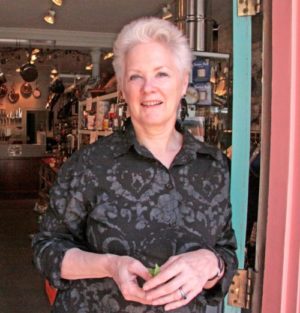
Kitchen Detail shares under the radar recipes, explores the art of cooking, the stories behind food, and the tools that bring it all together, while uncovering the social, political, and environmental truths that shape our culinary world.




Comments are closed here.
Follow this link to create a Kitchen Detail account so that you can leave comments!